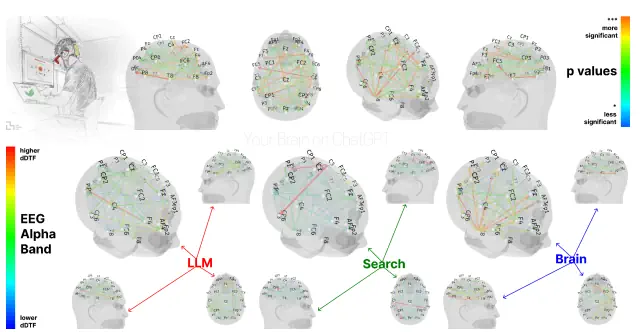Researchers from MIT Media Lab published the results of a study on the impact of using AI writing assistants like ChatGPT on students’ learning and brain activity. The study involved 54 students from five Boston universities, divided into three groups: one used GPT-4o for essay writing, the second used regular search engines, and the third wrote texts without any tools.

Over four months, participants completed essay-writing tasks on real SAT topics, while their brain activity was monitored using EEG. Results showed that students relying on AI demonstrated the lowest brain network activity and engagement levels compared to those working independently. Participants who initially used AI and then tried writing independently could not achieve the same level of brain activity as those who always worked without assistance.
Text analysis revealed that essays created with GPT-4o were more similar to each other, containing standard ideas and repetitive vocabulary. Over 80% of students in this group could not recall quotes from their essays immediately after completing the task, indicating weak information retention. Essays written without assistance were noted for greater diversity and better content retention.
The study’s authors note that excessive use of AI for writing can lead to so-called “cognitive debt,” where a person loses independent thinking skills and struggles to absorb new information. They advise using such tools as support in later stages of learning, when writing skills are already developed, rather than as the primary method for completing tasks.
The study has limitations, including a small sample size and a focus only on ChatGPT and text tasks. The report has not yet been peer-reviewed, but its results have already sparked a discussion about the role of AI in education and the development of critical thinking.



